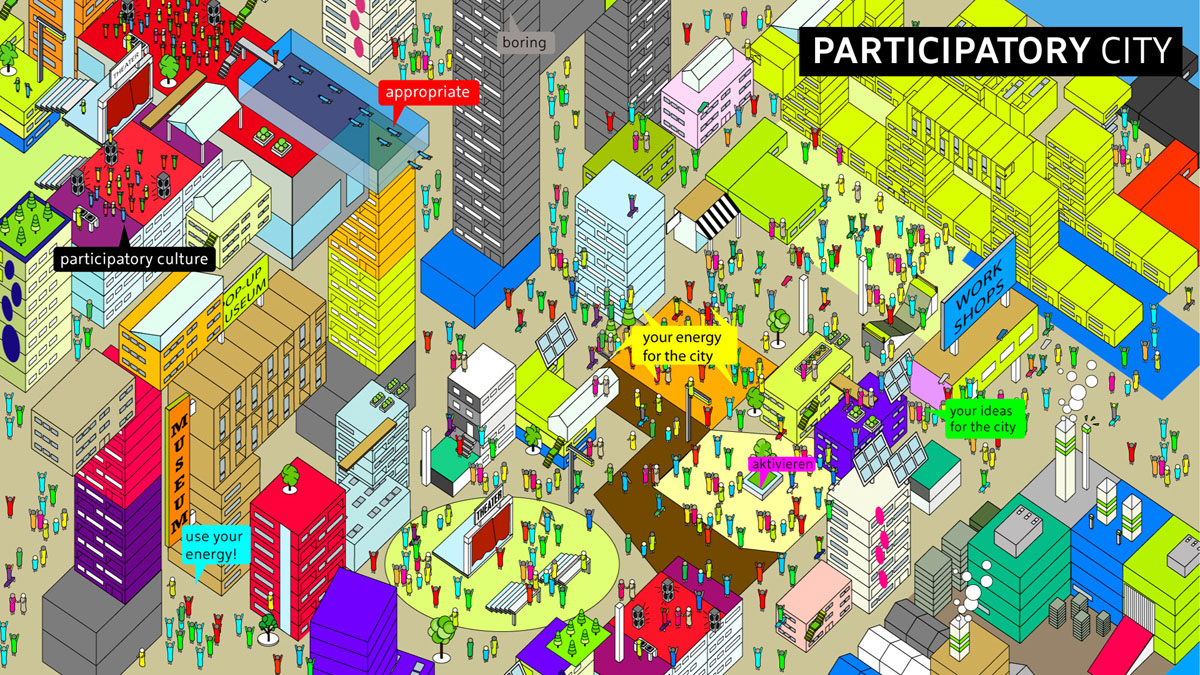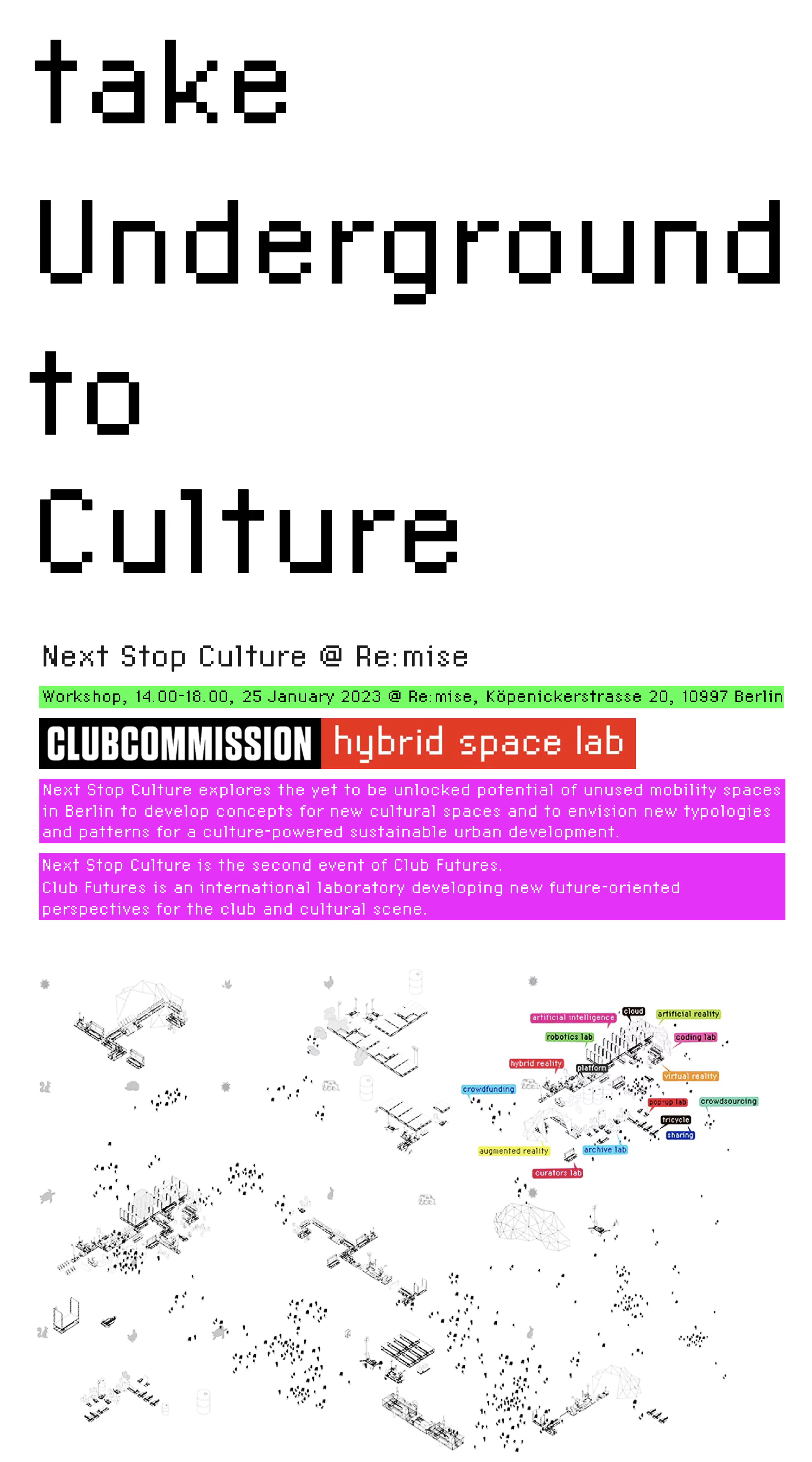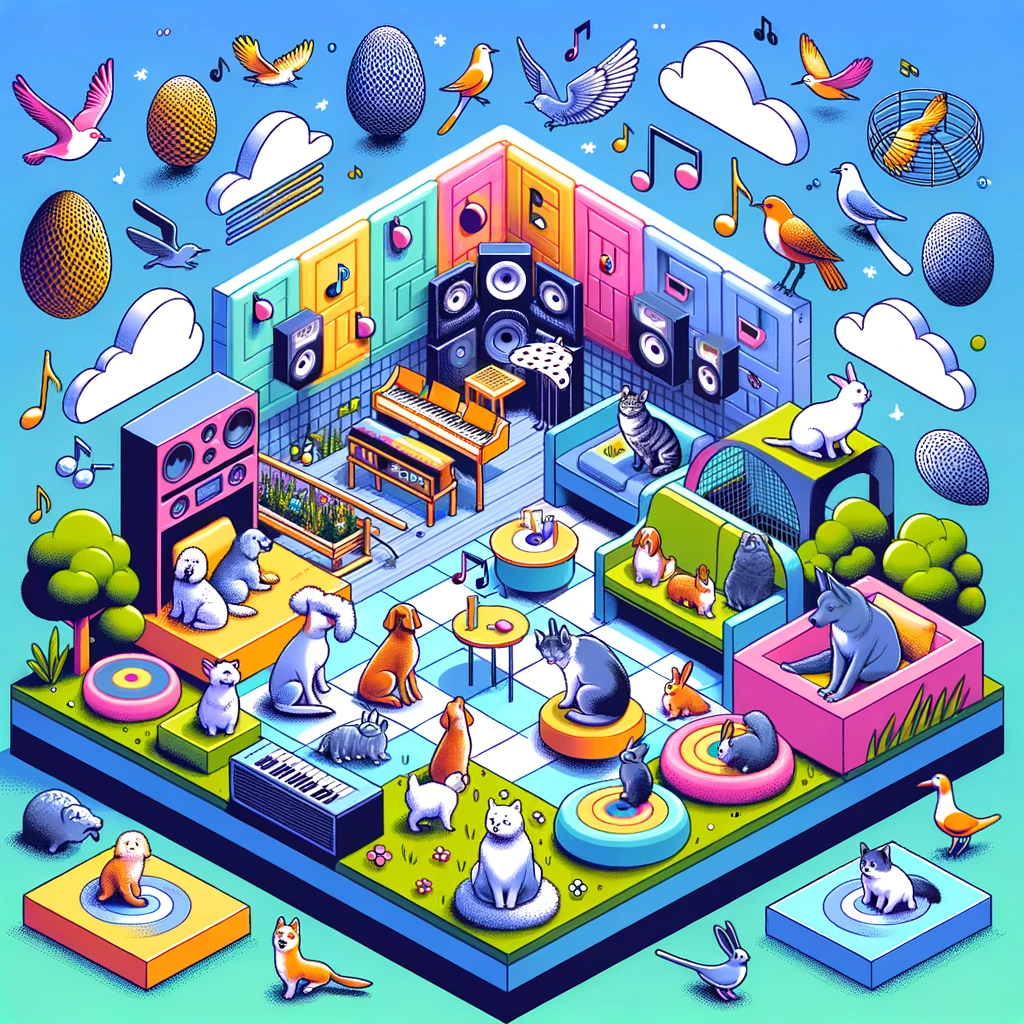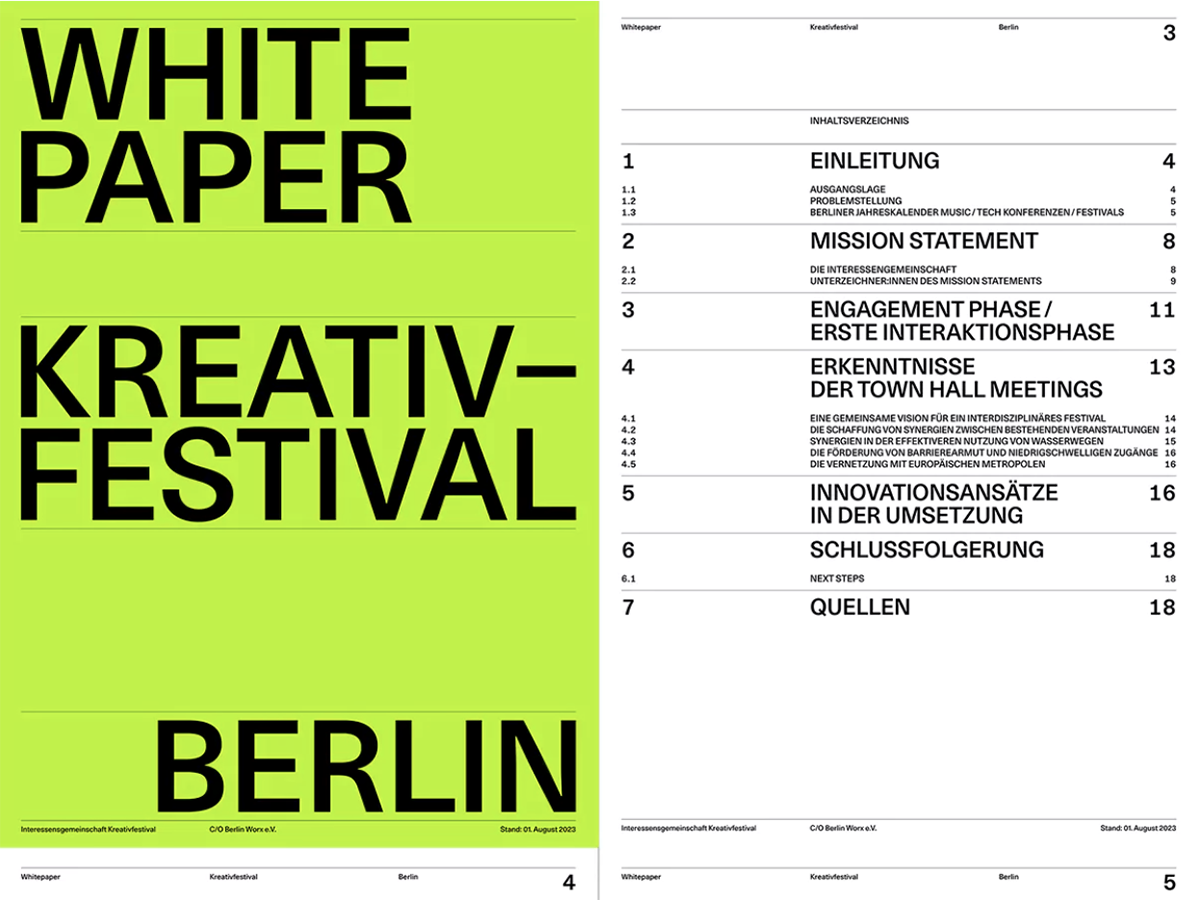Club Futures is an international laboratory with the aim of developing new future oriented perspectives for the club and cultural scene.
Exchange, Ideation, Research, Panels, Parties, Prototyping, Workshops Club Futures, @ Hybrid Space Lab, Berlin, Amsterdam, 2020~2023
Presentation & Workshop Animal Club, Co-Hosted by VibeLab @ Amsterdam Dance Event & SEXYLAND World, 1 Noordwal, Amsterdam, 18.30-24.00, 20 October 2022Workshop Next Stop Culture, Co-Hosted by Clubcommission Berlin @ transmediale & CTM Festival, Re:mise, Köpenicker Strasse 18, Berlin, 14.00-20.00, 25 January 2023
It is undeniable that club-going is a significant cultural practice of our time and Berlin has earned a reputation as a pioneer of related experiments and developments.
A group of visionaries and networkers is initiating an ideation and concept development project, inviting the clubbing and cultural scene to participate. In addition to developing innovative ideas and concepts, the program aims to initiate collaborations between clubs, cultural professionals, the creative and tech industries, as well as science and art, in order to foster sustainable and inclusive clubbing practices. Representatives from the Berlin and international clubbing scene meet with experts, visionaries, and creatives from various fields in a series of workshops and events.
The program addresses the multifaceted dimensions of club culture and examines the future of clubs as spatial-architectural venues, as cultural producers, and as service providers.
However, the focus is not on the increasingly widespread “status quo” of clubs as commercial venues. Rather, the aim is to examine the ongoing transformation of the clubbing world and to develop new perspectives beyond the reactivation programs called for in the wake of the Corona situation. How can club culture, in a similar way to the trends that characterized Berlin in the 90s, benefit from experimental, local, social, and, in part, non-commercial influences?
The collapse of the traditional business models of our clubs caused by the pandemic has triggered new collaborations with the cultural scene, with visual and the performing arts. Additionally, we are witnessing the acceleration of technological developments such as concert streaming as well as the provision of other digital forms of formerly in-person entertainment and live performances.
With the global reach of digital club offer across different time zones, clubbing is emancipating itself from the night. Bicycles are being repurposed as PAs and sound machines, and parties are taking place outside of venues in parks, on the outskirts of cities, or even outside of physical space, in the virtual realm.
All of this can be understood as an extension of classic clubbing practices. The idea of a club experience that goes beyond music and dancing, outside the club walls, outside the night, even outside the city, raises the question: if clubs, as we knew them, are a thing of the past, where and how will new constellations with other cultural fields develop?
Through its exploratory, creative, and experimental approach, the Club Futures program unfolds gradually, over a series of sequential and interlocking workshops and events. Following this approach, the program addresses relevant aspects and dimensions of club culture and sheds new light on upcoming challenges.
With digital transformation having the potential to be a most impactful game-changer in the future of clubbing, as well as of the event and entertainment industry at large, the program first dives into and explores the potential of hybrid (combined physical and media, onsite and online) formats. Such explorations on Hybrid Clubbing, relying on the insights from tech-pilots, innovators, and pioneers, lead to speculating on possible Club Cultures, with new models that open up new perspectives for venues and the communities associated with them. This then expands beyond the direct clubbing scene, involving players from culture, tourism and the hospitality sector as well as from urban governance, forming synergies, fostering new collaborations and innovative, sustainable models towards a Club Fu-Tourism.
The results of each phase of the project serve as a basis and input for the subsequent program elements. As the project grows and expands its field of inquiry, broader constellations of actors are brought into the process through different event formats. An important concern of the program is to make the methods and results emerging from Berlin freely available and to invite the international cultural scene to further develop these future scenarios and to implement them into corresponding experiments.
The three progressive workshops and participatory event formats are outlined below:
The ubiquity and acceleration of the digital, and the associated transformation of physical spaces and experiences, are among the most obvious consequences of the current pandemic. Digital formats will continue to evolve, even as lockdown and restrictions are lifted. How is clubbing going to accommodate the digital spaces and networks that have been the lifebuoy of social life for several months, blooming and unfolding next to physical spaces of cohabitation and encounter?
It is not only about whether we are happy with a mostly online social life. More importantly, it is a matter of designing meaningful sociocultural interactions in a way that ensures the longed-for spontaneity, richness, and integrative power even in hybrid (combined – physical and digital) formats. In this hybridization of the club cosmos lies the opportunity to address aspects of accessibility and inclusion on multiple dimensions.
The program explores innovative tech solutions such as wearables, gaming environments, and VR and XR applications that are becoming relevant for clubbing, and speculates on future hybrid (combined physical and digital) clubbing experiences.
Considering the primal characteristics of club culture (movement, state of trance, sex, and playfulness, etc.) that existed way before the digital revolution or even venues, it is important to address how to preserve these urges and motivations while introducing new concepts. Can technologies help reach “augmented” aesthetics and perceptions, creating unique atmospheres and enhancing immersive experiences?
In addition, the program addresses broader general questions, such as the relationship between physical experience and digital identity. It questions, for example, the extent to which physical clubbing experiences are becoming essential means to the digital identity-building of younger generations.
* How is digitization changing club culture, and how can it be a radical drive to rethink clubbing as an adaptable, multifaceted cultural practice?
* And how does the future of clubbing look like, or sound and feel like?
Club Futures reflects on and elicits responses from different clubbing (sub-)cultures, exploring clubbing (business) models and their long-term adaptability and sustainability.
With globalization and mass tourism, many clubs have reflected the wider trend, increasingly to the international mainstream event culture, reaching out to a less and less specified audience whilst expanding and diversifying performances genres and styles. Accelerated by the pandemic-induced crisis, economically powerful (global) players expand and progressively establish themselves in previously local markets, inaugurating clubbing franchising and integrating locally owned clubs into chains of the entertainment industry.
Club Futures discusses these given trends and changes in the industry and also speculates on the chances of a more specialized, context-specific, genre-committed approach to clubbing as opposed to the mainstream of the entertainment industry. More specifically, an innovative integration of hybrid (combining physical venues and digital reach) elements into the clubbing experience has the potential to support clubs’ individual cultural flair.
As a far-reaching, long-tail type of effect of digitalization, clubs could regain genre specificity and character, developing their scene back by building up commitment to artists. Teaming up with diversified crews, strengthening identities deeply rooted in sub-culture and repurposing the “authenticity” of the club experience could all be part of a wider expansive strategy. Such a strategy could also accommodate the integration with broader fields, such as “hybrid” exhibitions, cultural products and services, wellness and lifestyle consulting.
Considering the future of the clubbing experience, how are future clubs going to combine wellbeing, safety and health of club-goers, developing new clubbing concepts, such as “Health Clubs” or “Fitness Clubs”, addressing the needs of an aging population of clubbing golden-agers.
The future of clubbing also needs to be alert to and aware of clubs’ ecological footprint, pushing forward-looking, genuinely progressive thinking about the sustainability of venues and events.
More broadly, still, the current challenges have confirmed that the clubbing world needs to revisit and radically adapt revenue models, for instance by considering crowdsourcing and blockchain technology to create self-sufficient businesses which are sustainable in the long run.
Addressing the multiple dimensions of clubs as spatial-architectural venues, as content creators, and as service providers, the program investigates and speculates on possible new models for clubbing.
* How are the different clubbing (sub)cultures reacting to the current situation?
* How can clubbing business models be rethought to guarantee long-term adaptability and sustainability?
Based on the previous two elements, the third part of the program stretches further into the future of clubbing as interconnected to the tourism and hospitality sectors and to urban development.
With tourism and travel being rethought and readjusted after the pandemic, the program speculates on new hybrid models, connecting clubbing to hospitality and tourism. Addressing physical mobility prompted by international club culture in connection to other industries, it reaches out to a broader business ecosystem to identify possible new collaborations, fostering innovative, future-proof practices.
Considering the interactions between clubbing and cities and regions, the program also engages with urban governance. Here, the project turns to issues of urban development, asking how the existence of club culture is affected by increasing gentrification – or how the need to decentralize tourist destinations coincides with the spatial marginalization (e.g. push to the urban margins) of club culture?
What happens to the urban fabric if club culture moves to the periphery? How would this reformulate the spatial cultural hierarchies of the city center and the suburbs? And how does clubbing affect perceptions of urban beauty, safety, wealth in specific spaces? How will it, in the future?
And as we see the city fabric being heavily affected by the current crisis, with urban voids encroaching and venues closing permanently, how can cultural practices reappropriate the newly freed up spaces, contributing to urban reactivation?
How can the concept of pop-up, autonomous, and independent clubbing venues echoing the early ‘90s Berlin be made current and adaptive? What could the role of the municipality be in helping the clubbing culture flourish, shape up and thrive? In what capacity could the municipality be involved, and how?
Let’s reinvent the way we party! It is a cultural, social, and political challenge – not only for Berlin. The clubs of the future – the future to the clubs!
* How can future clubbing be a driver for a low-impact, ecologically-minded future tourism?
* And how can fu–tourism support sustainable urban development?

Animal Club investigates the future of clubbing at the crossroads of technological innovation and the pressing urgency of biodiversity loss. It focuses on sustainable future club cultures, fostering and stewarding interspecies co-existence. What will club spaces look like when they are designed as interspecies habitats for human, plant, and animal life?
And how will the ongoing digital transformation be exploited for new artistic practices in interspecies clubs which allows humans to notice and co-create with more-than-human life? Animal Club creates a space of radical imagination.
We will explore how technology and creative practice can help clubs to assimilate within their neighborhood and biosphere, and how this will give birth to new forms of pleasure.
Animal Club experiments with innovative Artificial Intelligence to generate future visions enabling a groundbreaking method for creating concepts.
VibeLab and Hybrid Space Lab are inviting experts of the tech industry, urban development, investors as well as nightlife stakeholders for Club Futures first workshop Animal Club which is held during Amsterdam Dance Event (ADE) at SEXYLAND World in Amsterdam on 20th October 2022 from 16.00-24.00.
The Amsterdam Dance Event (ADE) is one of the most outspoken, influential and educational events for electronic music and its industry. With its conference, festival and educational incubator, ADE is able to create not only the industry’s biggest annual tent-pole moment, but also a solid foundation for future generations of electronic music professionals. The event attracts through its multidisciplinary programme; for five days and nights.
SEXYLAND World is a cultural clubhouse for creative living with an ongoing programme in Amsterdam.
A place where free space and shared ownership have been taken to a higher level by giving different cultural, creative and social initiatives their own space under one roof.
Next Stop Culture is the second event of Club Futures.
Club Futures is an international laboratory with the aim of developing new future-oriented perspectives for the club and cultural scene.
Next Stop Culture explores the yet to be unlocked potential of unused mobility spaces in Berlin to develop concepts for new cultural spaces and to envision new typologies and patterns for a culture-powered sustainable urban development.
Next Stop Culture workshop takes place at the experimental club Re:mise, Köpenicker Strasse 20, 10997 Berlin.
Hybrid Space Lab and Clubcommission Berlin are inviting international experts of the tech industry, urban development, investors as well as nightlife stakeholders.
transmediale is an annual festival that brings together international artists, researchers, activists and thinkers with the aim of developing new perspectives on our technological age by interweaving different genres and curatorial approaches. transmediale is one of the most important events for art and digital culture worldwide.
CTM Festival combines multi-perspective experiences, critical reflection, hedonism and collaborative learning through an annual festival and ongoing collaborative projects, publications, commissions, concerts, club nights and more.
Club Fiesere Miese is located next to the Sage restaurant at Köpenickstraße 20 in Kreuzberg, Berlin. In June 2011, the Remise, a vacant building, was converted into a club.

The new Creative & Tech Festival in Berlin has the added value of being an interdisciplinary and joint festival of all Berlin’s creative and technology industries. Collaboration between different sectors of the creative and tech industries strengthens also the innovative character of the festival. An interdisciplinary approach helps to develop innovative ideas that go beyond conventional patterns of thought and customary practices of the separate sectors.
This interdisciplinary approach lies at the core of Hybrid Space Lab’s project INbetweenSTITUTE, a transdisciplinary platform for cultural innovation.
Hybrid formats can be embedded in the urban landscape and society through infrastructure. This can help reach and integrate a global audience, potentially beyond Europe. A shared hybrid infrastructure that is mobile, nomadic, modular and based on sharing models can consist of different elements. Such an infrastructure promotes environmental sustainability by relying on circular sharing practices and by embedding the festival with a minimum footprint in urban nature, for example in parks and waterways. This also helps to anchor the festival in Berlin’s neighborhoods and urban society, making it largely accessible and supporting thus social sustainability.
The implementation of a hybrid infrastructure that is mobile, nomadic, modular and based on sharing models is described in detail in Hybrid Space Labs project Reboot Culture.
A prototype and model for embedding the festival in urban waterways is the 1999 project reBoot, a boat fitted with a media lab, floating along the Rhine, from Cologne to Amsterdam.
The sharing practices and the festival itself can therefore serve as a testing ground for new innovative business models that promote economic sustainability. Hybrid Space Lab’s program (Re)Venue engages with this challenge of how to offer meaningful visitors’ experiences whilst keeping afloat of financial needs, by ideating innovative business models for cultural institutions.
By defining thematic focal points, a common festival identity is to be created, reflecting the interdisciplinary character of the event. These focal points can serve as guidelines and be based on the common goals and values of the participating actors. They provide a framework within which different creative fields and disciplines can come together and contribute their diverse perspectives. This encourages collaboration, exchange and ultimately a shared vision between the different actors.
Club Futures is an international experimental lab to beam clubbing into the future.
Club to the Future!
related PROJECTS
related NEWS

